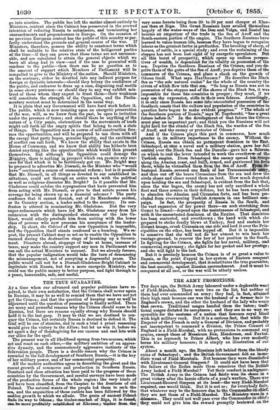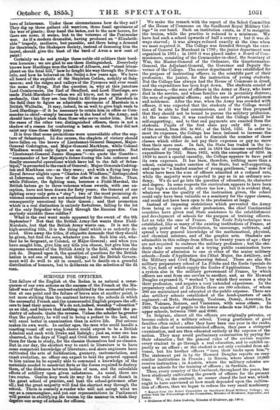TAR, ii.R.MY FlIOXOTIONS..
Tsar days ago, the British Army laboured-under a deplorable want of 7ield-.Maraha1s. There were two on the list, but neither of them had ever commanded an army ; they had, in fact,, attained their high rank because one was the husband- of- a- former heir to England's crown, and the other the husband of the lady who wears that crown. Traditional' usages handed them the baton; tradi- tional usages dictated its acceptance ; and they are in no way re- sponsible for- the customs of a nation that honours royal blood with high military rank. But it is a curious fact, that while the Emperor of the French is-only a General of Division, and probably not incompetent to command a division, the Prince Consort of England.is a Field-Marshal, with no pretensions ta command any armies, except those of Messieurs. Fox; Henderson, and Paxton. This- is tea reproach to Prince Albert, who has ever modestly borne his military honours; it is simply an illustration of our system. About a month ago, the Russians left behind them. the bloody ruins of Sebastopol ; and the British Government felt an imme- diate waut of Field-Marshals. Not because they were dissatisfied with Lieutenant-General Simpson.? It could not have been that the failure at the Redan made them conscious that the British Army lacked a FieldMarshal ? Yet their conduct is ambiguous. The British Army in-the Crimea had fairly won its share in a great victory after the, heroic efforts or s year's warfare. There was Lieutenant-General Simpson at its head—the very Field-Marshal required, one would think. But it is not so ; for everybody feels, that whatever may be the honours due to the Commander-in-chief, they are not those of a Field-Marshal. The Ministry were in a dilemma. They could not well pass over the Commander-in-chief; they could not give him the reward promptly bestowed on the
hero of Inkerman. Under these circumstances how do they act? They dig up three gallant old warriors, three fossil specimens of the war of giants ; they hand the baton, not to the new heroes, for there are none, it seems, but to the veterans of the Peninsular war. As if a modern dramatist, having produced an " Elizabeth- able " tragedy, mediocre, but passable, and there being a demand for theatrical; the Shakspere Society, instead of decreeing him the laurel, should give the bust, of the bard of Avon a new coat of paint !
Certainly we do not grudge these noble old soldiers their hard- won honours; we are glad to see them distinguished. Everybody knows how Hardinge won the battle of Albuera, and "stood trium- phant on the fatal hill," how he fought his way through the Penin- sula, and how he behaved on the Sutiej a few years ago. We have all heard of the exploits of Sir Stapleton Cotton, notably at.Sala- mance ; and the ridges and valleys of the Pyrenees will ever recall the name of Byng. But the question is, why at this-juncture Lord Combermere, the Earl of Strafford, and Lord Harding*, are made Field-Marshals ?—when we all know, not to speak it pro. profanely, that they are less fitted to fill the post of Marshals in the field than to figure as admirable specimens of Marshals in a British Walhalla. It may, indeed, be as well to give high rank to Lord Ilardinge—if it. be necessary to retain him in office as Com- mander-in-chief—simply because he is the head of the Army, and. should have higher rank than those who serveunder.him. But in the cases of the other two distinguished officers, there is not a shadow of a reason for conferring a. baton on them, that- clidnot exist any time these thirty years. It is true that some promotions were unavoidable after the cap- ture of. Sebastopol. In due course, the chaplets of victory should have fallen on the brows of Lieutenant-General Simpson, Major- General Codrington, and Major-General Markham, while Colonel Windham would only figure as- an. exceptional appendix. But "Lieutenant-General Tames Simpson."2—we quote the Gazette- ', commander of her Majesty's forces during the late arduous and finally successful operations which have led to the fall of Sebas- topol,' is promoted to the rank of General; Major-Generals Codring- ton and Markham are—as they were; and:with a flying. leap the Royal favour alights upon "Charles Ash Windham," distinguished at Inkerman, and the hero of the attack on the Redan. Thus, while Pelissier, the fighting man, becomes a Field-Marshal, the British batons go to three veterans whose swords, with one ex- ception, have not been drawn for forty years; the General of our. fighting army only gets a " step "; two of thorned promising di- visional commanders are not mentioned by their General, and are consequently unnoticed by their Q,ueen ; and that promotion which is a real distinction is entirely fortuitous falling to the lot of the only Brigadier who lived through the Russian fire. Can anybody unriddle these riddles ?
What is the real want made apparent by the event of the 8th September P Not that the British Army-list wants three Field- Marshals, but that the British Army wants one. It is not the high-sounding title, it. is the thing itself which is so ardently de- sired. _Giveaway the titles, if etiquette demands that. they should be given, but. find. the man whatever you do. Seek him out,,whe- ther he be Sergeant, or Colonel, or Major-General; and when you have caught him, give.him any title you choose, but give him the supreme command of the British Army in the field, whatever else you do. Depend upon it, the_question.of gnestions for the British nation is not one of names, but things; and the British Govern- ment will do well to sit in council, not to decide on.a graceful distrilintion.of honours,, but. to deliberate_ on the selection of the fit
men.



























 Previous page
Previous page